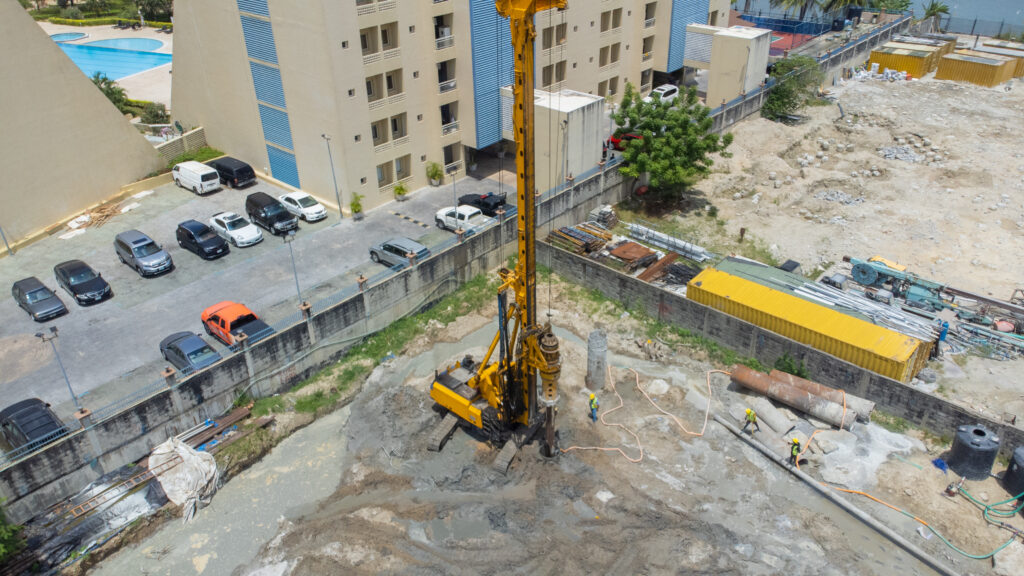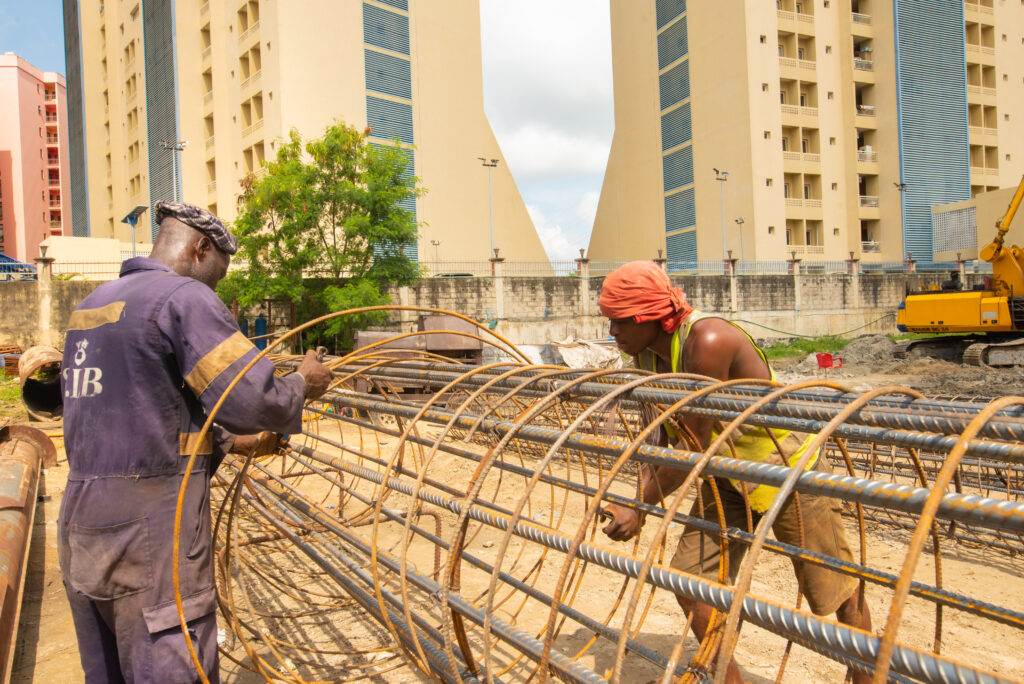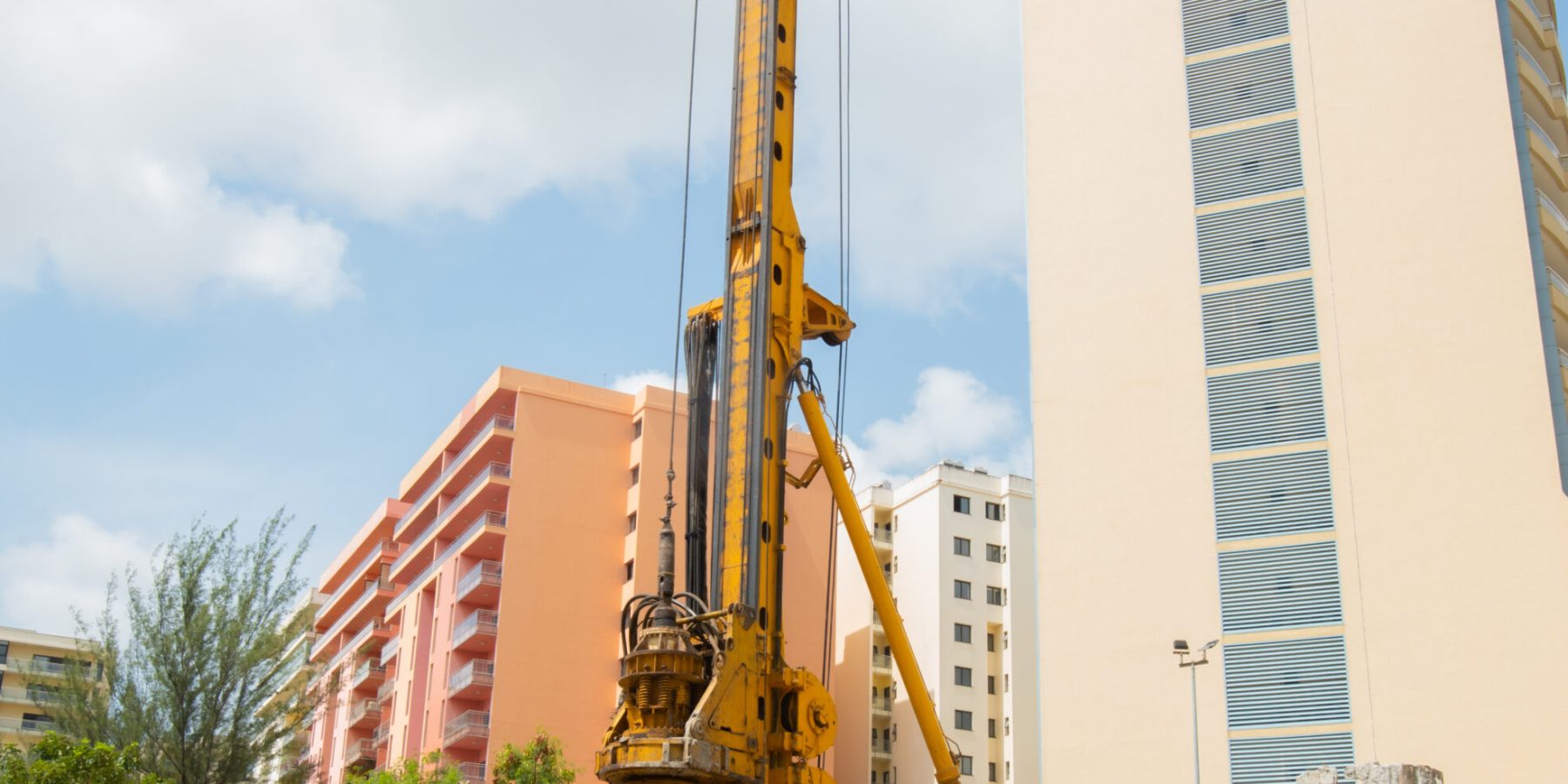About FECO NG
You Construct a Dream. We Will Construct Them Into Reality


Total Foundations
/ Our Story
Not a Gimmick, But a Truthful Reality
FECO (foundation and earthworks company) Is a piling and geotechnical contractor Based in the Kingdom of Saudi Arabia for the last 25 years, the Company’s structure utilizes many years of experience working with all sorts of difficult ground conditions to provide modern economical solutions to the construction and associated industries.
As we had, large range of piling and other foundation equipment, we reinforced recently our assets with a large range of modern piling equipment that can execute all types of piling works.
Our new states of art machinery were part into operation recently to cover the recent requirements for a large diameter pile with deeper drilling and with efficiency matching with the tight work schedules.
foundation provides the complete one step solution to basement and foundation construction with design, supply and installation expertise being available to give the best and efficient methods of working.
/ Company Activity
Pilling
We have one of the largest fleets of Modern Hydraulic powered drilling rigs in Saudi Arabia and use the most modern techniques available.
There are several factors considered when deciding what type of piled
foundation is most suited to a project.
First factor is to be taken the soils presents on the site together with any contaminated spoil issues, ground water and site access. This factor will start themselves to identify the most suitable for the project.
Second factor is the pile capacity must be determined initially the required load to be carried will be viewed against the structure capacity of a pile, its durability, and any settlement limitations. Ultimately the geotechnical bearing capacity will be considered considering competence of the soil strata, installation method, site conditions and various subsoil data.
Thirdly, the cost is always an important consideration deep foundation with various previous projects and implementation for wide scope of piling at various locations kingdom wide together with the available updated data, out of each and every executed project can assist in determining the most cost-effective solution to a project.
/ Company Activity
Retaining walls
Deep foundation contractors are experienced at designing and building hard/soft and hard/firm secant walls using continuous flight augur or bored piles techniques or segmental casings for applications of various pile diameters upwards.
The development of powerful high das led to an increase in the range of
ground conditions and obstructions that can be penetrated and the wall
thickness that can be constructed. We can install secant walls in the most
challenging environment.
Where soils are saturated and water tightness is a required secant materials (soft) or weaker concrete (firm) are used in combination with reinforced concrete (hard) piles. These alternatives are generally used where temporary works are required. Permanent are retention can be provided with all reinforced piles (hard/hard) which can be incorporated within the final structure. Piles in a secant wall are spaced at 0.8 to 0.9 pile diameters. Primary piles are secanted by secondary piles, thus providing a closed structure to act as a barrier in water bearing soils, and to prevent the ingress of soil between the piles.
Secant piling offers minimal vibration and low noise levels and the flexibility to fit complex site boundaries, maximizing land use. Secant piling also can go through underground obstructions such as steel,heavily reinforced concrete,granite and masonry while at the same time avoiding any risk of construction induced settlements to neighboring structures.
/ Why Choose Us
We Are Advanced and Right for the Work
If you’re looking for a reliable and trustworthy company to work with, then look no further. Here are just a few reasons why you should choose us:

FECO (foundation and earthworks company) Is a piling and geotechnical contractors Based in the Kingdom of Saudi Arabia for the last 15 years, the Company’s structure utilizes many years of experience working with all sorts of difficult ground conditions to provide modern economical solutions to the construction and associated industries.
/ Our Stats
Let Our Best Services Make Your House the Best
Total Foundations
Awards Winning
Total Projects
Years Experience
/ FAQs
Frequently Asked Questions
Certainly! To provide you with a purchase quote in advance for piling and earthworks projects, we would need some specific details about your project. These details could include:
Project Scope: Please provide a clear description of the piling scope, including the type and size of thepiling works, the exact quantity, soil report, pile load capacity considered and any specific requirements or specifications.
Site Information: Share the location of the construction site, along with any relevant details such as accessibility, site conditions, and any potential challenges that might impact the execution of the work.
Design or Engineering Drawings: If you have any design or engineering drawings available for the
project, please provide them. These drawings will help us assess the scope of work more accurately and provide a more precise purchase quote. Specifically, column load distribution.
Project Timeline: Indicate the desired project start date and the estimated duration for the piling and earthworks activities. This information will help us understand the project schedule and allocate resources accordingly.
Additional Services: If there are any additional services you require, such as soil testing, surveying, or
geotechnical analysis, please specify them. These services might influence the overall cost and can be included in the purchase quote. Or any value engineering to the design in hand.
Once we receive the above details, our team will carefully evaluate the project requirements and provide
you with a comprehensive purchase quote that outlines the estimated costs for the piling and earthworks
construction. We aim to provide transparent and competitive pricing while ensuring the highest quality
standards.
Please keep in mind that the purchase quote provided in advance is based on the information provided, and any changes or additional requirements during the project may result in adjustments to the final cost.
Nonetheless, we are committed to working closely with you to meet your specific needs and deliver a
successful construction project
The amount of advance payment required for piling and earthworks construction is typically determined through negotiations and is outlined in the contract or agreement between the parties involved. The
specific terms and conditions regarding the advance payment are typically agreed upon based on various factors, including the project's size, complexity, and duration.
In practice, the advance payment can range from a percentage of the total project cost to a fixed amount.
This advance payment is usually made to facilitate the mobilization of resources, procurement of necessary materials, and to cover initial expenses associated with the project.
It is important to note that the exact percentage or amount of the advance payment is subject to mutual agreement between the contracting parties and is influenced by industry practices, local regulations, and specific project circumstances. The terms and conditions related to the advance payment are typically discussed and decided during the negotiation phase and documented in the contract to ensure clarity and mutual understanding.
As a professional service provider, we are committed to maintaining transparency and fair practices in all financial transactions. We will work closely with you to determine the appropriate advance payment amount based on the project requirements and in compliance with relevant contractual agreements and
industry standards.
The duration to execute piling for a high-rise building can depend on various factors associated with the project. These factors include the size and complexity of the building, the number of piles needed, the characteristics of the soil at the site, the chosen piling method, and the overall project schedule.
The piling process involves several sequential steps, including site preparation, setting up piling rigs and
equipment, conducting soil investigations, installing piles, and verifying their integrity. Each of these steps requires careful planning and execution to ensure the stability and structural integrity of the building.
The time required to complete the piling phase depends on the number and type of piles needed to support the high-rise structure adequately. Large-scale projects may require more time due to the increased number of piles and the complexity of the piling operation. Additionally, challenging soil conditions, such as rock formations or soft soils, may require additional time for specialized piling techniques or ground
improvement works.
On average, the piling phase for a high-rise building can take several weeks to several months to complete. This estimation includes activities such as mobilization, site preparation, conducting necessary tests, driving or installing piles, and performing quality control checks.
It's important to note that each project is unique, and the piling duration can vary significantly depending
on project-specific factors. Engaging experienced geotechnical engineers, piling contractors, and construction professionals can help develop a detailed project plan and provide a more accurate
estimation of the piling duration based on the specific requirements of the high-rise building.
Efficient project management, adherence to safety protocols, and effective coordination between various stakeholders are crucial in ensuring the timely and successful execution of the piling phase for a high-rise construction project.
When it comes to quality assurance in piling and earthworks with construction, several tests are commonly performed to ensure the integrity and stability of the structures. Here are some key tests that are typically conducted:
Soil Investigation: This involves collecting soil samples from the construction site and performing various laboratory tests to determine its composition, bearing capacity, and other relevant properties. This
information helps in designing suitable foundations and assessing the suitability of the soil for piling and earthworks.
Geotechnical Testing: These tests evaluate the physical and mechanical properties of the soil formations, such as density, compaction, permeability, shear strength, and consolidation characteristics. The results
aid in determining the appropriate construction techniques, materials, and design parameters.
Pile Integrity Testing: This test is conducted to verify the integrity and load-bearing capacity of installed piles. It helps in identifying any potential defects, such as cracks, voids, or structural irregularities in the piles, which could compromise their performance and stability.
Load Testing: Load tests are performed on completed piles to assess their load-carrying capacity and ensure they meet the design requirements. This involves subjecting the piles to incremental loads and
monitoring their settlement and behavior under different load conditions.
Cross hole Sonic Test: This is a valuable technique in geotechnical engineering, enabling the assessment
of the integrity and quality of cast-in-place concrete piles by analyzing the propagation of sonic waves within the pile cross-sections.
Field Density Testing: This test measures the in-situ density of compacted earthworks or backfill
materials. It ensures that proper compaction techniques have been employed, which is crucial for achieving the desired stability, settlement control, and load-bearing capacity of the constructed structures.
Slope Stability Analysis: This assessment is carried out to evaluate the stability of excavations, embankments, or slopes in earthworks. It involves analyzing factors such as soil properties, groundwater conditions, and the slope geometry to determine the safety and potential risks of slope failure.
Quality Control of Materials: Various construction materials, such as concrete, aggregates, and reinforcing steel, undergo quality control tests to ensure they meet the required specifications and
standards. These tests involve assessing properties like strength, durability, and dimensional accuracy.
The mobilization time for piling and earthworks with construction can vary based on the specific project
requirements. Upon receiving the necessary approvals and agreements, we strive to mobilize to the site as
quickly and efficiently as possible. The exact timeline for mobilization depends on factors such as the project size, complexity, and logistical considerations.
Before mobilizing to the site, certain preparatory steps need to be undertaken. These may include conducting site visits and surveys, procuring necessary permits and approvals, coordinating with
subcontractors and suppliers, mobilizing equipment and machinery, and establishing safety protocols.
Typically, smaller projects with simpler requirements and readily available resources can be mobilized
within a shorter timeframe, often ranging from a few days to a couple of weeks.
However, larger and more complex projects may require a longer mobilization period, ranging from a few weeks to several months.
It's important to note that while expedited mobilization is desirable, it is equally crucial to ensure
thorough planning and preparation to maintain the highest standards of safety, quality, and efficiency
throughout the construction process. By striking the right balance, we can optimize the mobilization time
while adhering to project-specific requirements and industry best practices.
Regarding the daily progress of the FECO team and its equipment in piling and earthworks construction,
it is important to note that progress can vary depending on the specific project, site conditions, and the scope of work involved.
As FECO, we strive to maintain a consistent and efficient workflow to ensure
timely completion of projects while adhering to the highest standards of quality and safety.
The daily progress of the FECO team is managed through a well-defined project management system that
includes regular coordination and communication among team members, clear work plans, and effective resource allocation. Our experienced project managers closely monitor the daily activities to track progress, address any potential challenges, and make necessary adjustments to keep the project on
schedule.
In terms of equipment, FECO maintains a fleet of reliable and well-maintained machinery suitable for
piling and earthworks. The specific equipment used on a daily basis depends on the project requirements, site conditions, and the nature of the work being carried out. Our equipment operators undergo regular training and follow strict maintenance protocols to ensure optimal performance and minimize downtime.
It is important to understand that the daily progress of the FECO team and its equipment is subject to various factors that can impact productivity, such as weather conditions, unforeseen site challenges, and any necessary coordination with other trades or stakeholders.
However, FECO is committed to maximizing efficiency and maintaining a steady pace of progress throughout the construction process to
deliver successful projects to our clients.
/ Quotation
Get the Project Estimation
FECO (foundation and earthworks company) Is a piling and geotechnical contractors Based in the Kingdom of Saudi Arabia for the last 25 years, the Company’s structure utilizes many years of experience working with all sorts of difficult ground conditions to provide modern economical solutions to the construction and associated industries.




